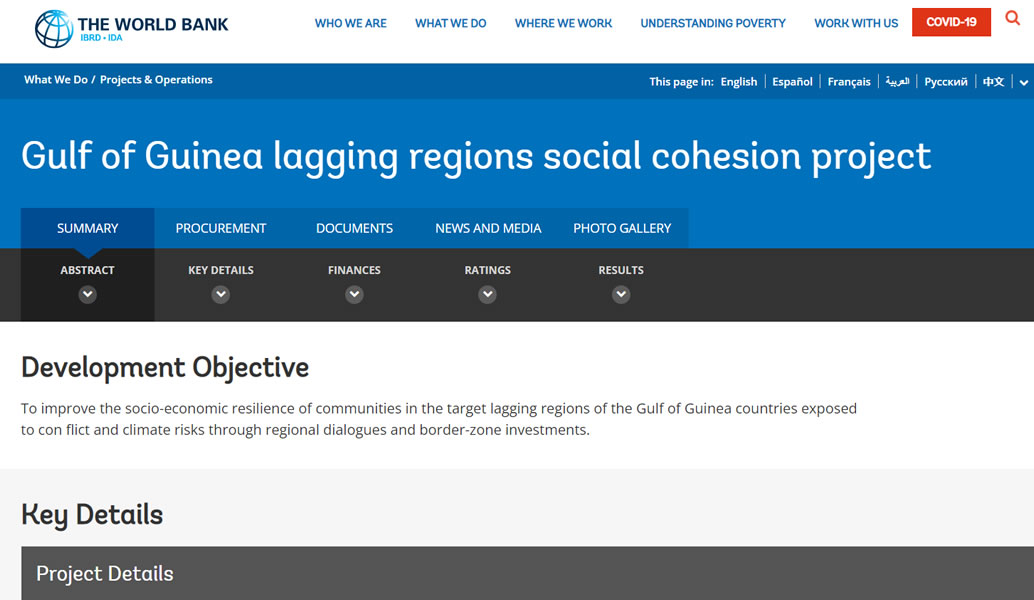- The Government of Ghana (GoG), through the Ministry of Finance, is to receive a grant of USD 150 million facility from the International Development Association/International Bank for Reconstruction and Development of the World Bank Group towards the implementation of the Gulf of Guinea Northern Regions Social Cohesion Project (SOCO, P175043). The project covers the northern geographic sections of Ghana, Benin, Cote d’Ivoire,and T The Ministry of Local Government, Decentralisation and Rural Development will lead the Ghana Project implementation, with forty-three (43) District Assemblies located in six Regions (namely Northern, North East, Upper East, Upper West, Savannah and Oti regions). The project will follow a Community Development Approach (CDD) in selecting and implementing Project investment activities. The proposed Project will be implemented over five (5) years.
The development objective of this project is to improve regional collaboration and socio-economic and climate resilience of border-zone communities in the target northern regions of the Gulf of Guinea countries exposed to conflict and climate risks.
- The proposed Project is structured into the following five (5) main components:
- Component 1: Community Resiliency and Inclusion
The objective of this component is to create community resilience and cohesion for preventing fragility, conflict and violence (FCV) risks. This component will finance local-level investments to promote community resilience and inclusion in border areas, based on a territorial medium-term vision that is shared across the four countries. The approach to be used in promoting interventions will include assisting communities to identify and prioritize their most pressing socio-economic infrastructure needs.
- Component 2: Building foundation and capacity for inclusive and resilient communities
This component will finance various training and capacity building activities that can build the foundation and capacity of local stakeholders across the GoG countries, especially in four key dimensions: (a) identify and implement subprojects under Component 1, (b) create a base for the local economic ecosystem with a cross-border vision that can lead to medium to long-term territorial development in the target northern region, (c) equip targeted youth in border communities with skills to engage in project's activities, and (d) promote better understanding and practice of social inclusion and cohesion. The beneficiaries of this component will be the communities, local governments (LGs), community facilitators, local technical staff of line ministries and partners, as well as certain critical national-level stakeholders.
- Component 3: Regional Coordination Platform and Dialogue
This component aims to strengthen regional collaboration across the four target countries to support a coherent response to prevent FCV risks in the Gulf of Guinea (GOG). Specifically, it will finance the establishment of a Regional Cooperation Platform (RCP) under the project, structured around three key pillars: (a) data collection and analysis, (b) knowledge generation, and (c) dialogue building. Data collection activities aim to enhance access to quality data and information to better understand complex regional and national FCV and climate dynamics.
- Component 4: Project Management
This component will support project management and coordination at the regional, national, and subnational levels to effectively implement project activities. The component's project management areas include planning, implementation, and technical oversight of program activities; social and environmental safeguards management and monitoring; overall financial management (FM) and procurement activities.
- Component 5: Contingent Emergency Response Component (CERC)
This zero-budget component will serve as a contingent emergency funding mechanism that could be triggered in the event of a natural or man-made disaster and/or health crisis such as pandemics through formal declaration of a national emergency or upon a formal request from one of the Governments. In the event of such a disaster/crisis, funds from the unallocated expenditure category or from other project components could be reallocated to finance emergency response expenditures to meet urgent needs.
- The Ministry of Local Government, Decentralisation and Rural Development will be the lead Ministry in implementing the project. This will be done by establishing a National Project Implementation Unit (PIU), a National Oversight Committee and a National Technical Committee. The MLGDRD will closely collaborate with other Ministries and Agencies partnering the implementation of the project (i.e., Ministry of Food and Agriculture, Ministry of Youth and Sports, Ministry of Interior, Northern Development Authority, Environmental Protection Agency, among others) in the execution of interventions under the project. At the field level, the targeted forty-three beneficiary District Assemblies in the six regional administrative areas in the northern participating regions in the country will be the primary channels for providing financial and technical support to the frontline implementing communities.
- Investment activities of the SOCO Project will be guided by the World Bank’s Environment and Social Framework (ESF). By the ESF requirements, the project potential environmental and social Risk Rating has been classified by the World Bank as moderate. Consequently, in line with the ESF provisions, the following Environment and Social Standards (ESS) are considered relevant for this Project:
- To this end, the following documents have been prepared and are being disclosed in compliance with the ESF as part of the project preparation activities:
- Resettlement Framework (RF)
- Environmental and Social Management Framework (ESMF)
- Stakeholder Engagement Plan (SEP)
- Stakeholders can also access copies of the Framework from the MLGDRD and the World Bank’s website.
- All enquiries should be forwarded to:
The Chief Director
Ministry of Local Government, Decentralisation and Rural Development
- O. Box M. 50
Ministries, Accra.
Tel: 0302-908224
Or
Email to: This email address is being protected from spambots. You need JavaScript enabled to view it.

